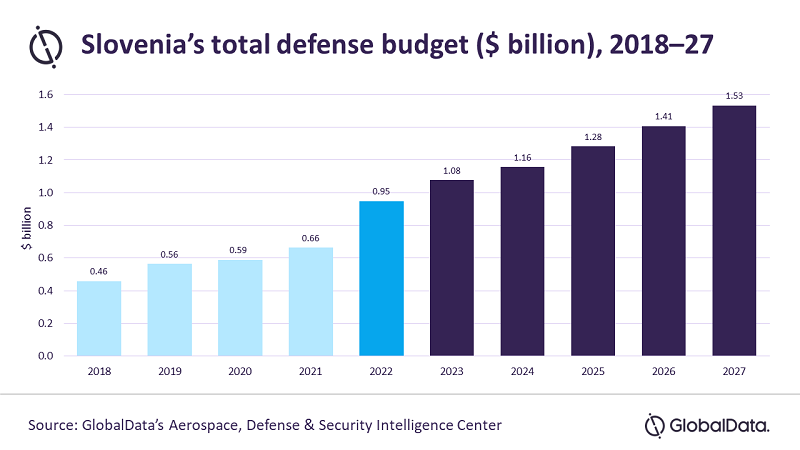Russia’s invasion of Ukraine driving Slovenia’s defence budget increase
The repercussions of Russia’s invasion of Ukraine continue to be felt as Slovenia is predicted to increase defence spending over next five years to meet the NATO benchmark, according to a report by GlobalData.
Slovenia is set to increase its defense spending over the next five years to reach $1.53bn by 2027 which would see the country meet NATO’s target of spending 2% of its gross domestic product (GDP) on defence.
The report, titled ‘Slovenia Defense Market Size and Trends, Budget Allocation, Regulations, Key Acquisitions, Competitive Landscape and Forecast, 2022-27’, notes that Slovenia is heavily reliant upon its membership of international organisations such as NATO for its security.
In order to continue to benefit from the collective defence offered by membership of NATO, Slovenia must remain an active and engaged member of the organisation.
To this end, meeting the 2% target for military spending would set a positive baseline for the country, while 2022 was also the first year that Slovenia met NATO’s other spending target of 20% of the defence budget being allocated to acquisitions.
Madeline Wild, associate defence analyst at GlobalData, commented: “Russia’s invasion of Ukraine has forced states across Europe to reassess their defense spending. Slovenia’s defence market is small, with current spending levels restricting Slovenia’s ability to bolster its defensive strength due to the small acquisition budget on offer. However, forecasted growth means that long term investments into major platforms can be carried out due to payments being split over a multiyear timeframe.”
One of the major ongoing procurement programmes within Slovenia is the acquisition of C-27J aircraft

// Dstl’s FILS technology demonstrator programme delivered a next-generation prototype assault rifle. Credit: Dstl Crown Copyright.
Shipbuilding is poised for digital change with clear benefits
The country’s growing defence spending is forecast to outpace GDP increases, rising from 1.5% of GDP being spent on defence in 2022, to 2.2% in 2027. This growth aligns Slovenia with its NATO allies who have also announced budgetary growth in order to meet the threat posed by Russia, the report highlights.
Slovenia can also strengthen its relationships with NATO allies through procurement programmes. Industrial collaboration can be beneficial in terms of what it can offer politically and in terms of the provision of military capabilities, while joint procurement programmes can help states strengthen their relationships and provide new channels for cooperation and communication.
Wild added: “One of the major ongoing procurement programmes within Slovenia is the acquisition of C-27J aircraft. This programme is part of a larger government-to-government agreement with Italy and will provide Slovenia with greater levels of independence in the aerospace domain.
“Currently, Slovenia is heavily reliant on its neighbours for air-based capabilities, but the acquisition of a C-27J is a significant step towards meeting Slovenia’s requirement for transport aircraft.”
// Main image: If spending increases as predicted, the Slovenian military will stand to benefit with more modern systems and platforms introduced. Credit: US DoD/ Spc. Tristan Bolden
DEFENCE BUDGETS